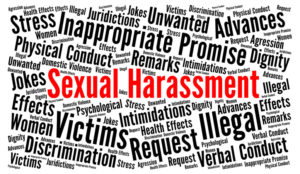Filing a Sex Discrimination (or Sexual Harassment) Claim as a Federal Employee
Federal employees have the same legal protections as private sector employees when it comes to discrimination and sexual harassment. However, the process is somewhat different for federal employees. If you believe you have been discriminated against on the basis of sex or are being sexually harassed, a federal employment discrimination attorney can guide you through the process of filing a claim.
Where You Need to Start
No matter how obvious or egregious the discrimination or harassment, you cannot immediately file a lawsuit. You must first navigate the administrative process. While this may seem like bad news, you may actually be able to resolve the issue more quickly and less expensively.
Notify Your Agency’s EEO Counselor
The first thing you need to do is notify your agency’s EEO counselor that you believe you have been discriminated against or are being harassed. You must contact your EEO counselor within 45 days from the date that the discrimination or harassment occurred. Failing to notify your agency could jeopardize your case, so it is best if you contact them as soon as possible. If you are unsure of whether you have a claim or simply want some advice as to how to proceed, a federal employment discrimination attorney can help.
EEO Counseling or ADR
Your EEO counselor will offer either EEO counseling or some form of alternative dispute resolution (ADR) such as mediation, if available. Counseling is typically completed within 30 days while ADR is typically completed within 90 days. At the conclusion of the process, your agency will reach an informal decision.
File a Formal Complaint with Your Agency
Your agency will notify you of the result of the counseling or ADR process. If you disagree with their decision, you then have the option to file a formal complaint with your agency. You must do so within 15 calendar days of receiving notice of the agency’s decision from your EEO counselor. Your formal complaint should include the following:
- Your name, address, and phone number
- A brief description of the discrimination or harassment such as whether you were denied promotion or were offered benefits in exchange for sexual favors
- The basis that you were discriminated against or harassed such as your gender, your gender identity, or your sexual orientation
- An explanation of how you were harmed by the discrimination or harassment
- Your signature
If you are unsure of what to put in your complaint or how to phrase it, a lawyer can help you draft your complaint and even sign it on your behalf.
Decision or Hearing?
Once the complaint is filed, your agency will conduct an investigation. The agency’s investigation must be completed within 180 days. Upon completion of the investigation, you can either request that the agency issue a decision or request a hearing before an administrative law judge (ALJ).
If you elect to have the agency issue a decision, you can either appeal it to the Equal Employment Opportunity Commission (EEOC) or file a lawsuit in federal district court.
If you decide to have your complaint heard by an ALJ, the ALJ will issue a decision on your complaint and the agency then has 40 days to decide whether it agrees with the ALJ’s decision and issue a final order. Once the final order is issued, you can either file an appeal with the EEOC or file a lawsuit in general district court.
EEOC Appeal
If you disagree with the agency’s final order, you have the right to file an appeal with the EEOC. Your appeal must be filed with the EEOC within 30 days of receipt of the final order. EEOC attorneys will review all records regarding your complaint including the agency’s investigation, the ALJs’s decision, and any transcripts. After reviewing your complaint, the EEOC will issue a decision. If you disagree with the decision, you can file a request for reconsideration. Once they make a decision on your request for reconsideration, however, the EEOC’s decision is final.
Filing a Lawsuit
As mentioned above, you must pursue your claim through the administrative process before you can file a lawsuit. If you have followed the process through to the end, you must file your lawsuit within 90 days of the final EEOC decision in order to protect your rights.
That said, you do not always need to follow the process all the way through to the end. You can file a lawsuit sooner rather than later in the following situations:
- If the agency has not issued a decision or filed an appeal within 180 days of the date you filed your complaint
- Within 90 days of receiving the agency’s decision on your complaint so long as no appeal has been filed
- If the EEOC has not issued a decision within 180 days of the date you filed your appeal
Contact The Law Firm of J.W. Stafford Today
The process for filing a sex discrimination or harassment complaint can be difficult and confusing. To discuss your case and how we can help, contact us today by calling 410-514-6099 to schedule a consultation.

